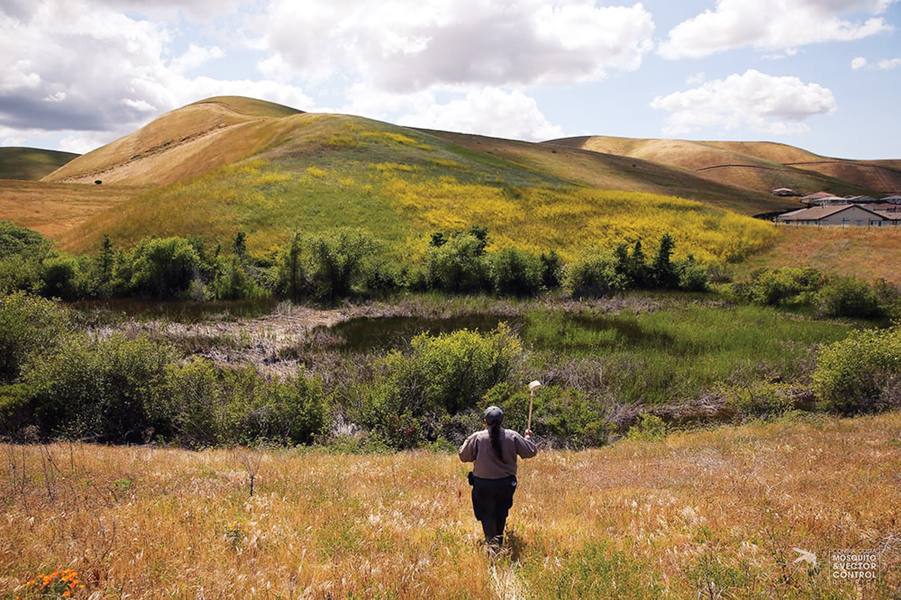Mosquitoes will linger in Contra Costa as long as mild temps hang around

CONTRA COSTA COUNTY, CA (Sept. 27, 2023) — The calendar may say it’s fall, but as long as overnight temperatures consistently hover above 55 degrees, those millions of nasty, West Nile Virus-spreading mosquitoes will still pose a threat.
Since 1927, the Contra Costa Mosquito and Vector Control District has been working to reduce the population of mosquitoes to the extent that they are less likely to put residents at risk of mosquito-borne illness. The staff of 32 seeks to protect public health by focusing on young mosquitoes as they develop in water, call Larval Mosquito Control (LMC).
“I would estimate 95% of our efforts to control mosquitoes are conducted while mosquitoes are in their larval stage while developing in the water. The goal is to control mosquitoes before they become biting adults,” said entomologist Steve Schutz, the district’s Scientific Programs manager.
Targeting the adults, too
Another district strategy was September’s Adult Mosquito Control (AMC) spraying operation, whose targets included 12 locations in Concord. AMC is designed to reduce the adult mosquito population in an effort to prevent human illness or to suppress a heavy infestation of mosquitoes.
There is no way to give an absolute number on how many mosquitoes there are or how many mosquitoes the district kills. But trap data for the AMC application at the Discovery Bay sewer plant showed 81 Culex tarsalis trapped before the AMC and only six after, which is about a 93% reduction, Schutz said.
While that statistic might sound impressive, Nola Wood, public affairs director for the district, acknowledged that the number of mosquitoes trapped near the areas of the September operation was also very low after the treatment.
“So, the work continues. Because mosquitoes can develop from egg to adult in as little as five to seven days, we are right back out there looking for potential larval sources to prevent mosquitoes before they develop into biting adults,” Wood said.
The district plans AMC spraying operations when surveillance and testing data reveal an increased vector-borne disease risk to people, or an overpopulation of mosquitoes.
“The decision to conduct Adult Mosquito Control is based on a risk assessment that includes a number of factors, including dead bird reports, positive test results for birds, mosquito trap counts, positive test results for mosquitoes, weather conditions and proximity to human populations,” Schulz said. “AMC is a method to reduce the immediate risk of disease transmission to people in areas where that risk is currently high; however, AMC is not our primary method of controlling mosquitoes.”
Residents on the alert
The district also employs Integrated Vector Management (IVM), which is an evidence-based, data-driven, decision-making tool used to suppress vector-borne diseases. It prioritizes surveillance of mosquito populations, removal of breeding sites, public outreach and education campaigns. The various tools to target mosquitoes at different life stages can include chemical control.
Contra Costa County residents can play an important role in the battle against mosquitoes by monitoring the conditions of their properties that might be ripe for the problem at its earliest stages.
The district urges residents to dump out and scrub outdoor containers of water, properly maintain swimming pools and other large water features and report neglected swimming pools. If residents still have mosquito issues after conducting all these prevention efforts, they can request the district’s mosquito service.
Note: A recent Nextdoor post by a Clayton resident offered a good message about handling dead birds, but the phone number to call about a dead bird was incorrect. You can reach the California West Nile Virus Dead Bird Call Center at 1-877-968-2473 (1-877-WNV-BIRD).
For more information and to sign up for Mosquito and Vector Control District notifications and a newsletter, visit www.contracostamosquito.com.

David Scholz
David Scholz is back in journalism as a freelance writer and photographer after nearly two decades in education. Prior to moving into teaching in 2000, he worked as a full-time journalist since 1988 for rural community and small daily newspapers in Central Ohio and Northern Nevada, and later in California with The Business Journal in Fresno and dailies in the Bay Area, including The Oakland Tribune and The San Francisco Chronicle. More recently Scholz also worked in an editing, writing, and page layout role with the Rossmoor News.
